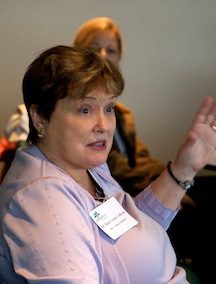LEADERSHIP UNC CHARLOTTE

Numerous studies have demonstrated that leadership development and mentoring are among the most successful ways to engage and help faculty members learn and grow. Consequently, UNC Charlotte ADVANCE has intentionally focused attention on these facets of professional develpoment to support faculty as they strive to reach their full potential, and administrators, to ensure they have the tools to facilitate their faculty’s success. The ADVANCE Faculty Mentoring Program provides additional professional support for tenure-track faculty.
UNC Charlotte ADVANCE established Leadership UNC Charlotte in recognition of the critical and central role that climate and experience at the departmental level play in the success of faculty.
This campus-based leadership effort offers department chairs and other leaders, identitifed by Deans of the colleges, an opportunity to explore and seek solutions to some of the challenges they might confront in the academic leadership environment. The format for Leadership UNC Charlotte consists of six to eight meetings (one each month) during the course of the academic year.
The group works together in small teams to address issues and consider possible solutions. They hear from speakers from various colleges and departments, as well as from external speakers. They develop relationships across colleges that are intended to provide them opportunities for sharing ideas and leadership across the university. Topics focus on issues such as creating an inclusive community and building consensus among faculty, successful faculty recruitment, faculty development and evaluation, effective departmental communication, negotiation skills, effective planning and managing change, leadership skills and balancing roles.
To maximize discussion time and build a sense of cohesiveness and trust, ADVANCE limits participation to twenty-four people for each class. A commitment to the entire program is required. Chairs and Deans may nominate members of their departments to attend this series, by outlining why a particular nominee would benefit from the program.
In an effort to address issues that are relevant for participants, the planning committee continues to invite participants to suggest or refine topics as part of the program. The program relies on the use of case studies and other materials to encourage discussion. Each session reserves time for participants to raise “hot topics” for discussion. Depending on the session topic, either internal or external facilitators lead the sessions.